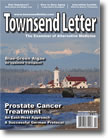A recent meta-analysis of 15 randomized controlled trials found that participants who received supplemental calcium had about a 30% higher incidence of myocardial infarction, when compared with subjects who received a placebo.1 The results of this study have been widely publicized, and have raised concerns about the safety of calcium supplements.
The evidence that calcium adversely affects the cardiovascular system is relatively weak, since it was derived from secondary, post hoc analyses of studies (mainly osteoporosis studies) that were not designed to test the effect of calcium on heart disease risk. The increased incidence of myocardial infarctions observed in the meta-analysis was of only borderline statistical significance (p = 0.035 to 0.038). Findings of borderline statistical significance from secondary analyses are more likely to be due to chance than are findings of borderline statistical significance from primary analyses. The results of the meta-analysis on calcium and myocardial infarction should therefore be interpreted with caution.
Although the available evidence is not definitive, it would not be surprising if long-term calcium monotherapy (i.e., giving calcium given alone, without other nutrients) does in fact promote the development of cardiovascular disease. Previous studies have shown that administration of large doses of single nutrients have the potential to cause deficiencies of, or imbalances with, other nutrients. For example, long-term administration of large doses of zinc can cause copper deficiency, resulting in some case in anemia, neutropenia, impaired immune function, serum lipid abnormalities, and neurological dysfunction (myelopathy). In addition, supplementation with large doses of alpha-tocopherol (one of the four naturally occurring forms of vitamin E) has been found to deplete gamma-tocopherol, which might explain the increased incidence of heart failure associated with alpha-tocopherol administration.2 This adverse effect would not be expected to occur if vitamin E is administered in the form of mixed tocopherols, rather than as pure alpha-tocopherol.
In animals, feeding a high-calcium diet decreased tissue levels of magnesium and, when the diet was deficient in magnesium, accentuated signs of magnesium deficiency. Some studies in humans have also suggested that calcium supplementation adversely affects magnesium status, although the evidence is conflicting.3 Magnesium has a number of cardioprotective effects. It inhibits platelet aggregation, relaxes smooth muscle (thereby promoting vasodilation), has antiarrhythmic activity, plays a role in the synthesis of ATP (which is required for normal cardiac function), promotes intracellular uptake of potassium (another cardioprotective nutrient), and possibly lowers blood pressure and raises HDL-cholesterol levels. Low or suboptimal magnesium status is common in the general population, due primarily to low dietary intake of the mineral and to the magnesium-depleting effect of various types of physical and emotional stress. In people with low or suboptimal magnesium status, administration of calcium without concomitant magnesium supplementation could further compromise magnesium status and thereby increase the risk of developing heart disease.
The potential interaction between calcium and magnesium with respect to cardiovascular disease is analogous to the interaction of these minerals in relation to kidney stone risk. Calcium supplementation has been found to promote the development of kidney stones when it is taken between meals or with meals that are low in oxalate (calcium taken with oxalate-containing meals actually decreases stone risk by inhibiting oxalate absorption). In contrast, magnesium inhibits the crystallization of calcium oxalate in urine, and magnesium supplementation has been reported to decrease the recurrence rate of kidney stones by 90% in recurrent stone-formers.4
It has been clearly established that adequate calcium intake is important for achieving optimal peak bone mass and for preventing osteoporosis. The results of the new meta-analysis should not dissuade people from taking moderate doses of supplemental calcium if their dietary calcium intake is not sufficient. However, most people taking supplemental calcium should also supplement with magnesium. Many practitioners administer calcium and magnesium in a ratio approximating 2:1, whereas others prefer a ratio closer to 1:1. There is virtually no research investigating the optimal ratio of these minerals. However, considering the estimated requirements for calcium and magnesium, I have usually recommended a ratio of approximately 2:1.
Calcium may also interact with silicon, another mineral that appears to have cardioprotective effects. In rats, calcium supplementation decreased the silicon content of bone.5 Silicon functions as a cross-linking agent in connective tissue, and might therefore enhance arterial integrity and protect arteries from injury.6 In rabbits fed an atherogenic diet containing presumably adequate amounts of silicon, the provision of additional silicon prevented the development of atherosclerosis.7 Based on this preliminary research, it would be reasonable to recommend a multimineral that contains both magnesium and silicon for people who are taking supplemental calcium. Good food sources of silicon include bananas, wheat bran, green beans, root vegetables, soybean meal, and beer. The silicon in grains is concentrated in the bran fraction, and substantial losses of silicon occur when grains are refined.
Alan R. Gaby, MD
Notes
1. Bolland MJ, et al. Effect of calcium supplements on risk of myocardial infarction and cardiovascular events: meta-analysis. BMJ. 2010;341:c3691.
2. Gaby AR. Vitamin E supplementation, cardiovascular events, and cancer. JAMA. 2005;294:425.
3. Gaby AR. Nutritional Medicine. Concord, NH; 2010. Chap. 26. www.doctorgaby.com.
4. Johansson G et al. Effects of magnesium hydroxide in renal stone disease. J Am Coll Nutr. 1982;1:179–185.
5. Carlisle EM. A relationship between silicon and calcium in bone formation. Fed Proc. 1970;29:565.
6. Schwarz K. Silicon, fibre, and atherosclerosis. Lancet. 1977;1:454–457.
7. Loeper J, Goy-Loeper J, Rozensztajn L, Fragny M. The antiatheromatous action of silicon. Atherosclerosis. 1979;33:397–408.
|



![]()
![]()
![]()

